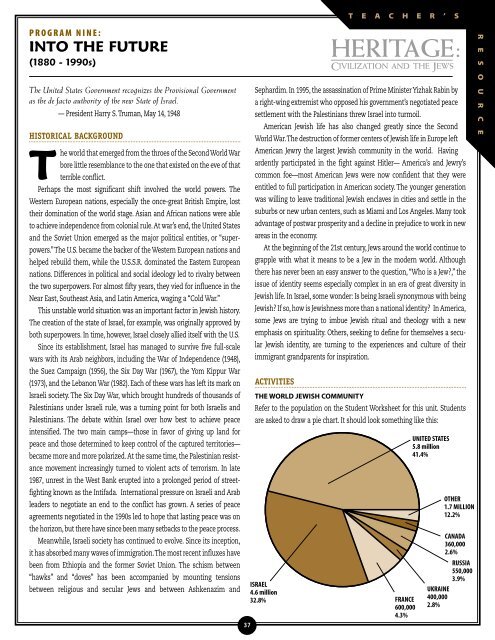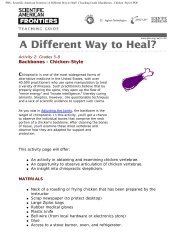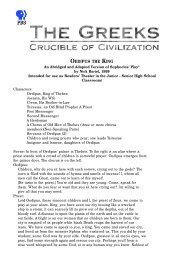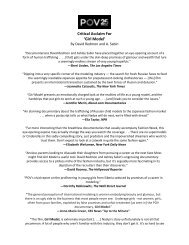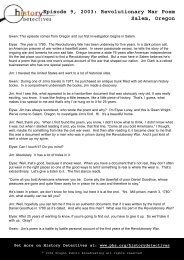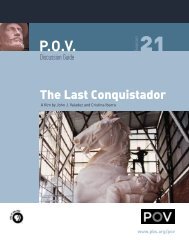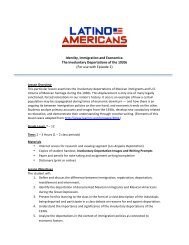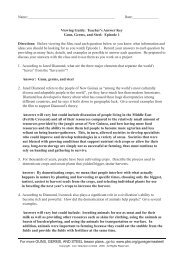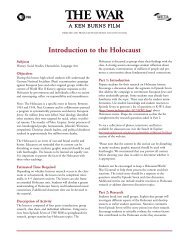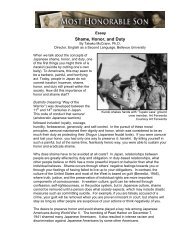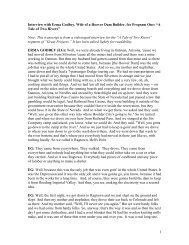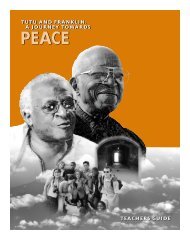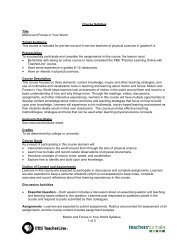HERITAGE: Civilization and the jews - PBS
HERITAGE: Civilization and the jews - PBS
HERITAGE: Civilization and the jews - PBS
Create successful ePaper yourself
Turn your PDF publications into a flip-book with our unique Google optimized e-Paper software.
PROGRAM NINE:<br />
INTO THE FUTURE<br />
(1880 - 1990s)<br />
The United States Government recognizes <strong>the</strong> Provisional Government<br />
as <strong>the</strong> de facto authority of <strong>the</strong> new State of Israel.<br />
— President Harry S. Truman, May 14, 1948<br />
HISTORICAL BACKGROUND<br />
The world that emerged from <strong>the</strong> throes of <strong>the</strong> Second World War<br />
bore little resemblance to <strong>the</strong> one that existed on <strong>the</strong> eve of that<br />
terrible conflict.<br />
Perhaps <strong>the</strong> most significant shift involved <strong>the</strong> world powers. The<br />
Western European nations, especially <strong>the</strong> once-great British Empire, lost<br />
<strong>the</strong>ir domination of <strong>the</strong> world stage. Asian <strong>and</strong> African nations were able<br />
to achieve independence from colonial rule. At war’s end, <strong>the</strong> United States<br />
<strong>and</strong> <strong>the</strong> Soviet Union emerged as <strong>the</strong> major political entities, or “superpowers.”The<br />
U.S. became <strong>the</strong> backer of <strong>the</strong> Western European nations <strong>and</strong><br />
helped rebuild <strong>the</strong>m, while <strong>the</strong> U.S.S.R. dominated <strong>the</strong> Eastern European<br />
nations. Differences in political <strong>and</strong> social ideology led to rivalry between<br />
<strong>the</strong> two superpowers. For almost fifty years, <strong>the</strong>y vied for influence in <strong>the</strong><br />
Near East, Sou<strong>the</strong>ast Asia, <strong>and</strong> Latin America, waging a “Cold War.”<br />
This unstable world situation was an important factor in Jewish history.<br />
The creation of <strong>the</strong> state of Israel, for example, was originally approved by<br />
both superpowers. In time, however, Israel closely allied itself with <strong>the</strong> U.S.<br />
Since its establishment, Israel has managed to survive five full-scale<br />
wars with its Arab neighbors, including <strong>the</strong> War of Independence (1948),<br />
<strong>the</strong> Suez Campaign (1956), <strong>the</strong> Six Day War (1967), <strong>the</strong> Yom Kippur War<br />
(1973), <strong>and</strong> <strong>the</strong> Lebanon War (1982). Each of <strong>the</strong>se wars has left its mark on<br />
Israeli society. The Six Day War, which brought hundreds of thous<strong>and</strong>s of<br />
Palestinians under Israeli rule, was a turning point for both Israelis <strong>and</strong><br />
Palestinians. The debate within Israel over how best to achieve peace<br />
intensified. The two main camps—those in favor of giving up l<strong>and</strong> for<br />
peace <strong>and</strong> those determined to keep control of <strong>the</strong> captured territories—<br />
became more <strong>and</strong> more polarized. At <strong>the</strong> same time, <strong>the</strong> Palestinian resistance<br />
movement increasingly turned to violent acts of terrorism. In late<br />
1987, unrest in <strong>the</strong> West Bank erupted into a prolonged period of streetfighting<br />
known as <strong>the</strong> Intifada. International pressure on Israeli <strong>and</strong> Arab<br />
leaders to negotiate an end to <strong>the</strong> conflict has grown. A series of peace<br />
agreements negotiated in <strong>the</strong> 1990s led to hope that lasting peace was on<br />
<strong>the</strong> horizon, but <strong>the</strong>re have since been many setbacks to <strong>the</strong> peace process.<br />
Meanwhile, Israeli society has continued to evolve. Since its inception,<br />
it has absorbed many waves of immigration.The most recent influxes have<br />
been from Ethiopia <strong>and</strong> <strong>the</strong> former Soviet Union. The schism between<br />
“hawks” <strong>and</strong> “doves” has been accompanied by mounting tensions<br />
between religious <strong>and</strong> secular Jews <strong>and</strong> between Ashkenazim <strong>and</strong><br />
37<br />
Sephardim. In 1995, <strong>the</strong> assassination of Prime Minister Yizhak Rabin by<br />
a right-wing extremist who opposed his government’s negotiated peace<br />
settlement with <strong>the</strong> Palestinians threw Israel into turmoil.<br />
American Jewish life has also changed greatly since <strong>the</strong> Second<br />
World War.The destruction of former centers of Jewish life in Europe left<br />
American Jewry <strong>the</strong> largest Jewish community in <strong>the</strong> world. Having<br />
ardently participated in <strong>the</strong> fight against Hitler— America’s <strong>and</strong> Jewry’s<br />
common foe—most American Jews were now confident that <strong>the</strong>y were<br />
entitled to full participation in American society. The younger generation<br />
was willing to leave traditional Jewish enclaves in cities <strong>and</strong> settle in <strong>the</strong><br />
suburbs or new urban centers, such as Miami <strong>and</strong> Los Angeles. Many took<br />
advantage of postwar prosperity <strong>and</strong> a decline in prejudice to work in new<br />
areas in <strong>the</strong> economy.<br />
At <strong>the</strong> beginning of <strong>the</strong> 21st century, Jews around <strong>the</strong> world continue to<br />
grapple with what it means to be a Jew in <strong>the</strong> modern world. Although<br />
<strong>the</strong>re has never been an easy answer to <strong>the</strong> question, “Who is a Jew,” <strong>the</strong><br />
issue of identity seems especially complex in an era of great diversity in<br />
Jewish life. In Israel, some wonder: Is being Israeli synonymous with being<br />
Jewish If so, how is Jewishness more than a national identity In America,<br />
some Jews are trying to imbue Jewish ritual <strong>and</strong> <strong>the</strong>ology with a new<br />
emphasis on spirituality. O<strong>the</strong>rs, seeking to define for <strong>the</strong>mselves a secular<br />
Jewish identity, are turning to <strong>the</strong> experiences <strong>and</strong> culture of <strong>the</strong>ir<br />
immigrant gr<strong>and</strong>parents for inspiration.<br />
ACTIVITIES<br />
THE WORLD JEWISH COMMUNITY<br />
Refer to <strong>the</strong> population on <strong>the</strong> Student Worksheet for this unit. Students<br />
are asked to draw a pie chart. It should look something like this:<br />
ISRAEL<br />
4.6 million<br />
32.8%<br />
T E A C H E R ’ S<br />
<strong>HERITAGE</strong>:<br />
CIVILIZATION AND THE JEWS<br />
FRANCE<br />
600,000<br />
4.3%<br />
UNITED STATES<br />
5.8 million<br />
41.4%<br />
UKRAINE<br />
400,000<br />
2.8%<br />
OTHER<br />
1.7 MILLION<br />
12.2%<br />
CANADA<br />
360,000<br />
2.6%<br />
RUSSIA<br />
550,000<br />
3.9%<br />
R E S O U R C E


